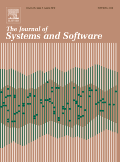
JOURNAL OF SYSTEMS AND SOFTWARE
Scope & Guideline
Catalyzing Progress in Software and Systems Knowledge.
Introduction
Aims and Scopes
- Software Testing and Quality Assurance:
The journal emphasizes methodologies for improving software testing, including automated testing frameworks, test case generation, and quality assurance practices to ensure reliability and performance in software products. - Software Security and Vulnerability Management:
A significant focus is placed on identifying and mitigating security vulnerabilities in software systems, exploring techniques for secure coding, vulnerability detection, and risk assessment. - Software Architecture and Design Patterns:
The journal covers research on software architecture, including architectural design patterns, microservices, and system resilience, aiming to provide insights into effective software structure and organization. - Machine Learning and Artificial Intelligence in Software Engineering:
Emerging trends in integrating AI and machine learning into software engineering practices are explored, including applications in code analysis, bug prediction, and automated decision-making. - Human Factors in Software Engineering:
Recognizing the role of human factors, the journal addresses aspects such as team dynamics, developer behavior, and user experience in the context of software development and maintenance. - Agile and DevOps Methodologies:
Research on agile practices and DevOps principles is prevalent, examining how these methodologies enhance collaboration, productivity, and software delivery processes. - Software Development Tools and Environments:
Investigation into tools that support software development processes, including integrated development environments (IDEs), version control systems, and collaborative platforms. - Sustainability and Ethical Considerations in Software Engineering:
The journal addresses sustainability in software development practices and ethical considerations related to software engineering, including privacy, data protection, and the impact of technology on society.
Trending and Emerging
- DevSecOps and Continuous Security Practices:
There is a growing trend towards integrating security into DevOps practices, known as DevSecOps, highlighting the importance of security throughout the software development lifecycle. - AI and Machine Learning Applications:
The application of AI and machine learning techniques in software engineering, particularly for tasks like bug prediction, code generation, and automated testing, is rapidly gaining traction. - Microservices and Cloud-Native Architectures:
Research focusing on microservices and cloud-native development is on the rise, addressing the challenges and best practices for building scalable, resilient software systems. - Data-Driven Software Engineering:
The trend towards leveraging data analytics to inform software engineering practices, including decision-making and process optimization, is becoming increasingly prominent. - User-Centric and Inclusive Design:
There is a heightened focus on user experience, accessibility, and inclusive design practices in software engineering, reflecting a broader societal push towards equity in technology. - Ethics and Responsible AI in Software Development:
Research exploring the ethical implications of software engineering practices, particularly concerning AI, data privacy, and user consent, is emerging as a critical area of focus.
Declining or Waning
- Legacy Software Systems:
Research focusing on legacy systems and their maintenance has become less frequent, possibly due to the industry's shift towards modern architectures and cloud-based solutions. - Formal Methods in Software Engineering:
Although formal methods played a crucial role in software verification, there has been a noticeable decrease in publications related to this area, indicating a potential shift towards more practical, less formalized approaches. - Traditional Software Development Methodologies:
As agile and DevOps practices gain traction, traditional methodologies such as waterfall and V-model have seen a decline in research focus, reflecting a broader industry shift. - Static Analysis Techniques:
The frequency of research dedicated to static analysis tools and techniques has waned, possibly due to the rise of more dynamic and context-aware analysis methods. - Empirical Studies on Software Maintenance:
There has been a reduction in empirical studies specifically targeting software maintenance practices, as newer topics gain attention.
Similar Journals

Jordanian Journal of Computers and Information Technology
Catalyzing Academic Excellence in Computing ResearchJordanian Journal of Computers and Information Technology, published by Princess Sumaya University and SRSF, stands as a significant platform for scholarly research in the realm of computer science, particularly in topics related to emerging technologies and information systems. With its Open Access model initiated in 2015, the journal facilitates global access to high-quality research findings, embodying the principles of knowledge sharing and academic collaboration. The journal's ranking in the Q3 category of Computer Science (miscellaneous) and its placement in the 54th percentile of Scopus' General Computer Science rankings underscore its growing reputation among researchers and professionals alike. Situated in Amman, Jordan, the journal actively contributes to the regional and international discourse on computing methodologies, applications, and innovations, making it an indispensable resource for scholars seeking to advance their understanding and engage with contemporary issues in technology.

Journal of Advances in Information Technology
Elevating Research Standards in Information TechnologyJournal of Advances in Information Technology, published by ENGINEERING & TECHNOLOGY PUBLISHING, is an essential platform for researchers, professionals, and students invested in the dynamic fields of information technology, artificial intelligence, and computer science. With its ISNN of 1798-2340, this journal provides a rigorous peer-reviewed environment that supports the dissemination of innovative research findings, methodologies, and case studies. Since its inception in 2019, it has made notable strides, as reflected in its Q3 quartile rankings across various categories, including Artificial Intelligence and Software, and maintains respectable Scopus rankings, further solidifying its position as a key player in the academic community. Featuring a diverse range of topics within its scope, the journal encourages open access to knowledge while serving as a beacon for those seeking to expand their understanding of current trends and technologies shaping the future. Join us in advancing the field with impactful research that is both relevant and cutting-edge.
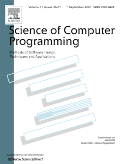
SCIENCE OF COMPUTER PROGRAMMING
Advancing the Frontiers of Programming ScienceScience of Computer Programming, published by Elsevier, is a leading journal dedicated to advancing knowledge in the fields of computer programming, computational theory, and software development. With a focus on interdisciplinary research that spans computational methodologies, information systems, and simulation modeling, this journal plays a vital role in disseminating innovative findings and fostering collaboration among experts in these dynamic areas. With a respectable impact factor and ranked in various Scopus Categories such as computational theory (Q3) and information systems (Q2), it provides a platform for high-quality scholarly articles that push the boundaries of programming science. Although currently not open access, the journal offers invaluable insights for researchers, professionals, and students alike, ensuring they are equipped with the latest advancements and methodologies to thrive in an ever-evolving technological landscape. The journal covers research from its convergence starting in 1981 and continues to welcome groundbreaking contributions as it looks forward to an exciting future through 2025 and beyond.
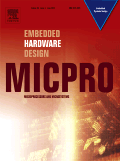
MICROPROCESSORS AND MICROSYSTEMS
Driving Insights in Hardware and Software IntegrationMICROPROCESSORS AND MICROSYSTEMS, published by ELSEVIER, stands as a pivotal journal in the fields of microprocessor technology and microsystem design, with a focus on cutting-edge research that bridges artificial intelligence, computer networks, hardware architecture, and software development. With an ISSN of 0141-9331 and an E-ISSN of 1872-9436, the journal is recognized for its significant contributions to the academic community since its inception in 1978 and continues to shape the discourse leading into 2024. Its impact is evidenced by its Scopus rankings, placing it among the top quartiles in multiple disciplines, including Q3 in Artificial Intelligence and Q2 in Computer Networks and Communications. Although it does not offer open-access options, the journal remains a vital resource for researchers, professionals, and students seeking to delve into innovative developments and applications within the realms of microprocessors and embedded systems. The journal is headquartered in Amsterdam, Netherlands, and aims to foster dissemination and discussion of scholarly work that advances the understanding of practical and theoretical aspects of microprocessor and microsystem technologies.
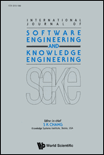
INTERNATIONAL JOURNAL OF SOFTWARE ENGINEERING AND KNOWLEDGE ENGINEERING
Empowering Engineering Minds with Cutting-edge InsightsThe INTERNATIONAL JOURNAL OF SOFTWARE ENGINEERING AND KNOWLEDGE ENGINEERING, published by WORLD SCIENTIFIC PUBL CO PTE LTD in Singapore, is a pivotal platform for disseminating cutting-edge research in the fields of software engineering and knowledge systems. With an ISSN of 0218-1940 and an E-ISSN of 1793-6403, this journal has been a reliable resource for scholars and practitioners since its inception in 1996. The journal is indexed across multiple prestigious databases, reflecting its relevance with a Category Quartile ranking of Q3 in both Computer Graphics and Computer Networks for 2023, and it maintains a steady trajectory of growth and scholarly contribution. Although not an Open Access journal, it is accessible through various academic institutions and libraries, ensuring researchers can engage with high-quality, peer-reviewed articles that explore advancements, theoretical developments, and practical applications in software and knowledge engineering. As it converges towards its end year of 2024, this journal continues to foster innovation and knowledge exchange, making it an essential resource for anyone invested in these dynamic fields.
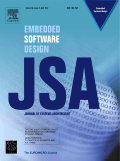
JOURNAL OF SYSTEMS ARCHITECTURE
Transforming Ideas into Architectural ExcellenceJOURNAL OF SYSTEMS ARCHITECTURE is a prestigious academic journal published by ELSEVIER, based in the Netherlands, that has established itself as a leading platform for research in the fields of Hardware and Architecture and Software. With an impressive impact factor and ranked in the Q1 category for both computer science sectors, this journal is recognized for its high-quality contributions, evidenced by its Scopus ranking of #32 in Hardware and Architecture and #74 in Software, placing it in the top percentiles of its field. The journal spans a wide range of topics central to systems architecture, focusing on innovative research that advances the understanding of computer systems and promotes future developments. Researchers, professionals, and students alike will find invaluable insights and emerging trends that address the challenges and opportunities within the rapidly evolving field of systems design and architecture. Spanning from 1996 to 2024, the JOURNAL OF SYSTEMS ARCHITECTURE continues to be a vital resource for those seeking to stay at the forefront of technology and research.

Computer Science and Information Systems
Bridging Theory and Practice in Information SystemsComputer Science and Information Systems, an esteemed journal published by the COMSIS CONSORTIUM, serves as a vital platform for researchers and practitioners within the field of computer science and information systems. With an ISSN of 1820-0214, this open access journal has been disseminating high-quality research since 2004, making scholarly content readily accessible to a global audience. Based in Novi Sad, Serbia, the journal has established itself as a point of reference in the academic community, achieving a Q3 ranking in the Computer Science (miscellaneous) category as of 2023. With its coverage spanning from 2008 to 2024, it caters to a diverse range of topics, including software engineering, data processing, and system architecture. Although the HIndex is currently not available, the journal holds a respectable 43rd percentile ranking in the Scopus database for general computer science, showcasing its relevance in the field. By offering an open access model, it ensures that groundbreaking research can be freely accessed and utilized, fostering innovation and collaboration across disciplines.
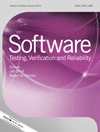
SOFTWARE TESTING VERIFICATION & RELIABILITY
Pioneering Excellence in Software AssuranceSOFTWARE TESTING VERIFICATION & RELIABILITY, published by Wiley, serves as a premier journal in the fields of software engineering, risk management, and quality assurance. With an ISSN of 0960-0833 and E-ISSN 1099-1689, this journal has been a pivotal resource since its inception in 1991, providing insights into the latest methodologies and technologies related to software testing and verification through to 2024. The journal is recognized for its rigorous peer-review process and boasts an impressive reputation, rated Q2 in Media Technology and Safety, Risk, Reliability and Quality, along with a Q3 rank in Software as of 2023. Its Scopus ranks further solidify its standing within the academic community, placing it in the 62nd and 43rd percentiles for Engineering and Computer Science, respectively. The journal fosters a collaborative environment for researchers, professionals, and students, encouraging the exploration of cutting-edge research, applications, and innovations in software testing and reliability, making it an invaluable asset for those seeking to advance their knowledge and expertise in this essential area.

ACM TRANSACTIONS ON SOFTWARE ENGINEERING AND METHODOLOGY
Exploring the Frontiers of Software Engineering InnovationACM Transactions on Software Engineering and Methodology, published by the Association for Computing Machinery, is a leading journal in the field of software engineering, featuring cutting-edge research and methodologies that influence practices and advancements in the discipline. Established in 1992, this journal boasts an impressive Q1 ranking in Software for the year 2023, signaling its high impact and relevance within the academic community. With its strong Scopus rank (#126/407) and a solid 69th percentile, it serves as a critical platform for scholars, practitioners, and students alike, promoting the dissemination of innovative ideas and solutions that drive the software industry forward. Although it operates without an open access option, it consistently publishes peer-reviewed articles, technological advancements, and case studies that shape the future of software engineering. The journal's commitment to quality and excellence makes it an essential read for anyone keen on understanding the complexities and methodologies transforming the field.
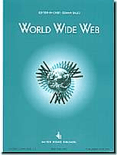
WORLD WIDE WEB-INTERNET AND WEB INFORMATION SYSTEMS
Innovating the Future of Web ResearchWORLD WIDE WEB - INTERNET AND WEB INFORMATION SYSTEMS, published by Springer, is a leading academic journal that focuses on the cutting-edge areas of Internet technologies and web-based information systems. With an esteemed ISSN of 1386-145X and an E-ISSN of 1573-1413, this journal has been a significant contributor to the fields of Computer Networks and Communications, Hardware and Architecture, and Software since its inception in 1998. The journal consistently ranks in the Q1 category across these fields, reflecting its high impact and relevance, evidenced by its impressive Scopus rankings where it stands in the upper percentiles (79th for Computer Networks and Communications, 77th for Hardware and Architecture, and 75th for Software). Researchers, professionals, and students looking to stay at the forefront of web information systems will find a wealth of valuable resources and innovative research compellingly presented in this journal, available for publication until 2024.